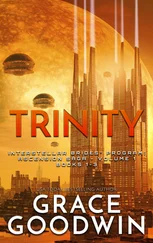“Mountains about halfway,” Radnor replied. “High point, Mount Purpula. Five thousand, three hundred twenty-six feet. Eight-hundred-foot television transmitter at Vitim.”
“Then we’re in the woods again,” Kazakhs continued, “and coming up on the lake.”
The lake. Moreau saw the frozen shore approaching, as she had in countless dreams. Holy Baikal, the Russians called it, the majestic ocean. They said it contained one-sixth of all the fresh water in the world—a saltless inland sea stretching four hundred miles long with barren nine-thousand-foot mountains jutting up from its western bank. She saw the lumbering bomber roar treetop level over the great lake’s deserted northern shore, kicking up powder snow off the ice, and her pulsing adrenaline turned to clammy sweat.
“Decision time,” Kazakhs went on. “Who makes it?”
“SIOP,” Moreau said. “Hours ago.”
“If SIOP, in its computerized wisdom, said the dam at Bratsk is still standing, we get a little side trip,” Kazakhs said. “We hop over the Baikal Mountains, lay a SRAM down on it, and scoot. Question of American pride. The Russkies say it’s the biggest dam in the world. We get to personally put Grand Coulee, right outside good ol’ Cowpatch, back on top.”
Kazakhs paused for a second, a shudder passing through him. The pilot’s chin edged forward and he began whistling softly… for amber waves of grain…
Moreau looked at him curiously.
“Opposition?” he asked.
“Surrounded like Fort Knox,” Halupalai answered. “SAM’s, MIG’s, antiaircraft batteries. Unfriendly place.”
“Yeah. Let’s hope we don’t have to make the visit. Hokay. We’re huggin’ the foothills of the Baikals now. Still a long haul in.”
“One hour,” Moreau said.
“Almost one hour,” Kazakhs confirmed, “and then we make the turn up the Angara River and…?”
“Irkutsk, forty miles,” Tyler responded.
“I got it in the weeds now. Ticklin’ your rumps down there?” Kazakhs didn’t expect an answer. “Targets, offense?”
“In the outskirts, we gotta loft a SRAM over the top at the oil refinery upriver at Angarsk,” Tyler said. “And then two more SRAM’s at the oil fields.”
“Mobil will thank you eternally, nav,” Kazakhs said. He felt shaky. His chin edged farther forward to cover… for purple-mountained majesties… “And Irkutsk. Targets?”… above the fruited plain…
Tyler floundered. “Targets?” he asked. Irkutsk was the target. “Satellite-tracking station, heavy industry, machine-tooling plants, electronics, Trans-Siberian Railway…” Tyler’s voice trailed off. He had never been asked that question before.
“Population?”
“Kazakhs!” Moreau protested.
“Just under a million,” Tyler responded. His voice was firm now, a game being a game. He felt better. His voice sounded better.
“Yep,” Kazakhs said. “Irkutsk gets the big banana. Gravity bomb. One megaton. Ground burst. Low level. Approaching. On the racetrack…”
Moreau began to protest. Then the adrenaline began pulsing again.
“On the racetrack,” Tyler repeated.
“Switch lights on,” Kazakhs said. “Pre Em lights on.”
“Entry plus two-niner-zero,” Tyler said. “Calibration, two-niner-zero. Midpoint two-four-zero. Exit two-eight-zero.”
“I.P. two-two-two-six.”
“Winds, twenty knots.”
Moreau sat mesmerized.
“Coming up on sixty seconds,” Tyler said. “Ready… ready… Now!”
“Hokay,” Kazakhs said. “Heading into bomb run. Straight down Karl Marx Street.”
“Coming up on twenty seconds,” Tyler said. “Ready… ready… Now!”
To Moreau, the silence seemed to go on forever.
“And?” Kazakhs demanded.
Silence.
“And?!”
“PUP!” Moreau responded urgently, automatically leaning forward to begin the Pull Up Pushover procedure that would arch the hydrogen bomb up slightly on its departure, giving them a few extra seconds’ escape time.
… America! America!… Kazakhs whistled. “Bomb away,” he said serenely…. God shed his grace on thee…
Moreau saw the bulbous weapon hover briefly beneath the open bomb-bay doors, saw the drogue parachute unfold to slow it on its short descent, saw it land in Karl Marx Street where people could stare at it for the few seconds before the time release activated. Then she saw the moon burst again. She started to tug at the controls. Her eye caught on the bomb-release lights, which were out. Her gaze fixed on the altimeter, which read 46,000 feet. Then she settled back in her seat and returned to the reality that they were still high over Canadian tundra, rapidly approaching their control point. Practicing. A recital. Damn you, Kazakhs.
“Bye-bye, Irkutsk,” Kazaklis said in a strangely quiet voice. “Bye-bye, mamushka,” he added, his voice almost inaudible.
Moreau felt a sudden wave of unexpected sorrow. She turned toward the pilot, watching his shoulders sag, his left hand sliding limply off the red bomb lever, his right slipping disconsolately from the wheel onto the throttle control box between them. Instinctively she slowly placed her hand on his. Neither spoke and Kazaklis let the copilot’s hand remain on his briefly. Then he pulled his hand away and began asking for the vectors for the course change that would take them to the other big-banana target, the city of Ulan-Ude.
“General, they’re seventy-five miles from their PCP.”
Alice stared into the panoramic world map lining one wall of the battle-staff compartment of the Looking Glass. He did not look away.
“Sir, we don’t want them wasting their fuel orbiting and waiting. Doesn’t make sense. Certainly not now.”
When Alice first had come aboard the Looking Glass, as a young pilot twenty years ago, the map had jarred his senses—although not for the reason it caught the attention of most first-time visitors. He had examined it for minutes before realizing what was wrong. The Eurasian continent, not the Americas, occupied the center of the huge wall map. Every map he had seen since childhood placed the Americas in the middle of the world with Eurasia stretching to the right until it stopped abruptly and arbitrarily somewhere beyond the Urals. Then the eyes had to swing far left to pick up the great landmass of Asia as it moved eastward across Siberia and India and China toward the center, America. It was a year later, during a tour of the Far East, before he realized no one else in the world drew maps the way Americans did.
“They’re minutes away, sir. We might have to try several frequencies to get through the crud in the atmosphere.”
On the Looking Glass map a searn ran through the center of the Asian landmass, creating an artificial ridge in a straight line south through central Russia past Afghanistan and Pakistan. Bombay was in the middle of the hump and then the ridge continued through the Indian Ocean to Antarctica. Even here, the general thought, we had to cut and paste to bring our world view into line with others. But it wasn’t conformity, like Americans be grudgingly adopting metrics, that dictated the change in the Looking Glass map. The Looking Glass wanted the target in the middle. All the targets. He pondered, only briefly, whether his Russian counterpart flew high over the ruins of Omsk or Sverdlovsk, staring at a pasted ridge of Middle America—Winnipeg on the hump, and Sioux Falls and Wichita and Oklahoma City and Corpus Christi, cut away from the edges of the world and glued together so they could become unglued now.
“Where is their PCP, Sam?” Alice asked. “Precisely.”
“About seventy miles northwest of the old DEW-line radar site at Tuktoyaktuk. Over the Beaufort Sea.”
Читать дальше












